Kategorie: ‘Mikro- und Nanoeletronik’
Prof. Max Lemme as co-author in Nature Photonics
The Faculty of Electrical Engineering and Information Technology congratulates Prof. Max Lemme on a special scientific achievement: as co-author, he contributed to a consensus statement publication in the renowned journal Nature Photonics. The publication is entitled ‘Guidelines for accurate evaluation of photodetectors based on emerging semiconductor technologies’ and provides important impetus for the international research community.
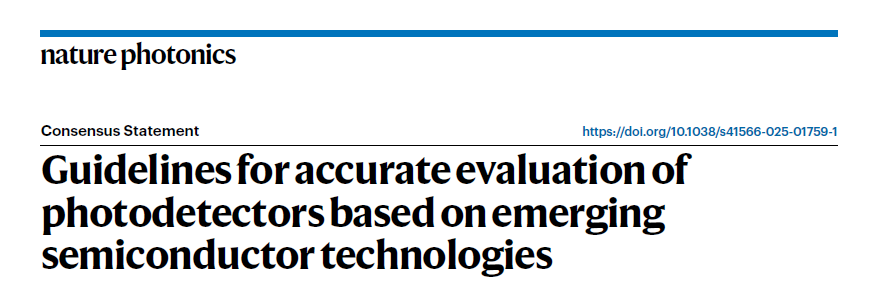
A consensus statement publication summarises the current state of knowledge in a specialist field and formulates recommendations, standards or procedures that promote reliable and uniform scientific practice. In this article, leading experts from research and industry have developed for the first time a comprehensive framework for the precise characterisation, documentation and comparability of photodetectors based on novel semiconductor materials.
There is a great need for such guidelines: photodetectors made from innovative material classes such as organic semiconductors, perovskites, quantum dots, two-dimensional materials, metal oxides and carbon nanotubes have made enormous progress in recent years. At the same time, inconsistent measurement methods and reporting standards have so far made it difficult to compare different studies and thus hindered scientific development in this field.
The recommendations that have now been published create a common foundation for the community and support transparent, reproducible and comparable research practices. This benefits not only academic working groups, but also industrial development processes and the emergence of future photonic technologies.
Prof. Max Lemme is not only the holder of the Chair of Electronic Components at our faculty, but also the managing director of AMO GmbH, whose research focuses are closely linked to the topics covered in the publication. The development and integration of novel materials for optoelectronic components is one of the company’s core activities. Participation in this international consensus paper underscores the great scientific and technological relevance of this work.
AMO GmbH has also highlighted the publication in its own article. Further information can be found on the website and on LinkedIn.
Four RWTH researchers admitted to the German Academy of Engineering Sciences
The German Academy of Science and Engineering, acatech for short, has accepted four scientists from RWTH Aachen University as new members: Fabian Kießling, Max Lemme, Constantin Häfner and Walter Leitner.
acatech is the central voice of technical sciences in Germany and is funded by the federal and state governments as a national academy. It advises politicians and society independently, factually and in the public interest on issues relating to shaping the future of technology. Its members come from the fields of engineering and natural sciences, medicine, and the humanities and social sciences. The patron of the academy is the Federal President.
With the admission of the four new members, a total of 35 scientists from RWTH Aachen University are now part of acatech. In addition to Professor Max Lemme, Professor Rainer Waser, Professor Dirk Uwe Sauer, Professor Jürgen Roßmann, Professor Rik W. de Doncker and Professor Steffen Leonhardt from the Faculty of Electrical Engineering and Information Technology are also members of the academy.
Max Lemme: Research into the electronics of the future
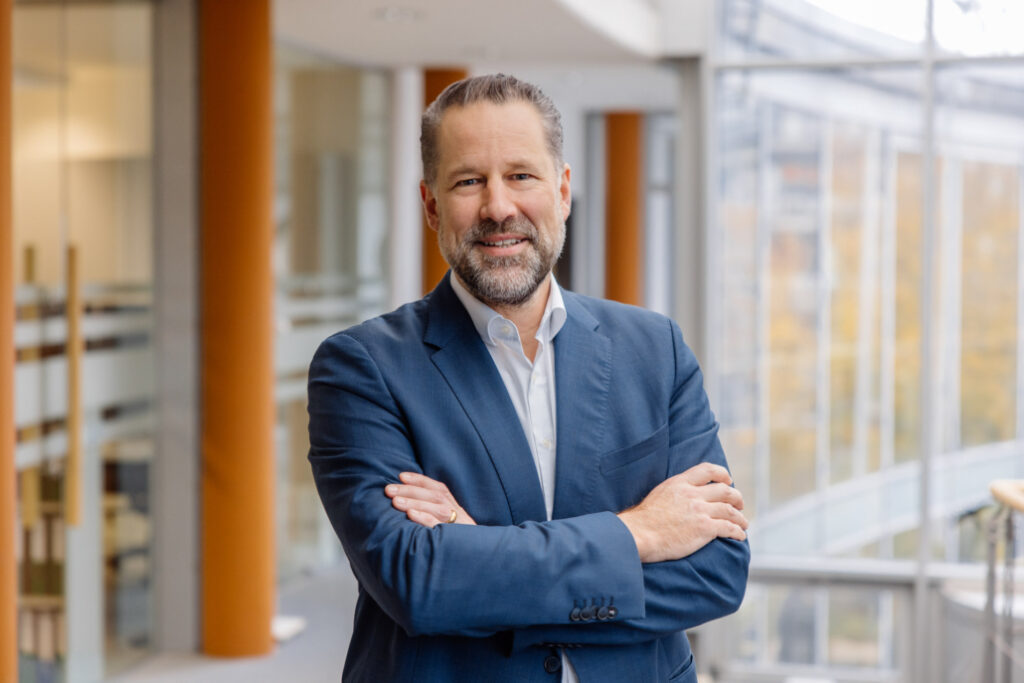
© Martin Braun
Professor Max Lemme holds the Chair of Electronic Components at RWTH Aachen University and is managing director of AMO GmbH. His research focuses on novel electronic and optoelectronic components based on two-dimensional materials such as graphene. The aim is to integrate these materials into future micro- and nanoelectronics, sensor technology and neuromorphic computing systems. Lemme is also spokesperson for the NeuroSys future cluster.
In addition to him, three other outstanding researchers from RWTH Aachen University were accepted into acatech: Professor Fabian Kießling, Director of the Helmholtz Institute for Biomedical Engineering and pioneer of molecular imaging, Professor Constantin Häfner, Director of Research and Transfer at the Fraunhofer Society and expert in high-power lasers, and Professor Walter Leitner, Chair of Technical Chemistry and Petrochemistry and Director at the Max Planck Institute for Chemical Energy Conversion.
Their admission recognises their scientific achievements and their contribution to the further development of technical sciences in Germany.
Observing 2D Memristors with Operando TEM: Another Step Toward Neuromorphic Computing
Understanding of conductive filament dynamics in memristive devices based on two-dimensional (2D) materials has been substantially advanced by a research team from AMO GmbH, RWTH Aachen University (Chair of Electronic Components), and Forschungszentrum Jülich.
The researchers used a transmission electron microscope (TEM), which instead of light uses a beam of electrons to make images, thus achieving imaging down to the scale of atoms through the short wavelengths of electrons. The operando state for TEM was used to observe the 2D components as they are operating, and not in before or after states. Which allows the nanoscale phenomena to be observed in real time.
Memristors are a key part of neuromorphic computing, which allows computation and memory in the same physical location so that the use of energy is radically minimized.
For this research, 2D sheets of molybdenum disulfide (MoS₂) were used. It is a compelling candidate for memristive devices owing to its atomically thin, layered two-dimensional structure, which features interlayer van der Waals gaps, which are nanoscale spacings maintained by weak van der Waals interactions that provide efficient transport pathways for ions and metal atoms. These pathways facilitate the controlled formation and dissolution of conductive filaments, thereby enabling the resistive switching behavior required for device operation.

Image 1 – Sheets of 2D Memristor and Pd-Ag Poles to create potential difference – nature.com
Silver ions were directly observed by the researchers as they moved through the MoS₂ medium along surface routes, within interlayer van der Waals gaps, and between bundles under applied voltage. There, they gather into metallic conductive filaments that bridge the electrodes and change the device into a low-resistance state; reversing the polarity dissolves these filaments and returns the device to a high-resistance state. In order to directly evaluate switching reliability as well as the causes of anomalous events and cycle-to-cycle variability, the operando TEM imaging is synced with current-voltage measurements. This allows them to track the nucleation, growth, motion, and rupture of individual filaments in real time and correlate these physical events to electrical signatures. They deduced the factors that influence switching performance from these observations, offering specific recommendations for the construction and functioning of devices.
These results give us specific ways to make memristive synapses more reliable for neuromorphic computing. By figuring out where silver filaments form (on MoS₂ surfaces, in interlayer van der Waals gaps, and between bundles) and measuring their sizes, the study makes it possible to better control how filaments grow and nucleate. By customizing the MoS₂ morphology and device geometry, engineers can adjust the SET/RESET voltages, limit the filament thickness, and thus improve the switching current and energy use. All of these physics-based ideas support device design and operation plans that are based on mechanisms and make memristive hardware for neuromorphic systems more stable, efficient, and scalable.
Looking ahead, as filament dynamics become programmatically controllable and device variability is tamed, neuromorphic systems could progress from lab prototypes to wafer-scale accelerators that learn on-device, operate at microwatt power levels, and approach brain-like energy efficiency. Hybrid 2D-material crossbars integrated atop CMOS may enable dense, 3D-stacked synaptic fabrics for lifelong on-chip learning, powering adaptive robotics and privacy-preserving cognition in everyday devices. With native plasticity at the device level, future machines could continuously adapt to their environments, compress and interpret sensory streams in real time, and deliver robust intelligence in battery-powered wearables and autonomous agents, bringing us measurably closer to brain-inspired computing platforms that transcend the limits of conventional digital architectures.
Source: nature.com
The illustrations were taken from the above-mentioned source. They are not in their original sizes and have been adjusted to aid in the explanation.
Cheerfully building bridges from neuroscience to computer technology to AI

On 18 June 2025, as part of the RIA lectures, Senior Professor Rainer Waser will present research on interfaces in the fields of neuroscience, computer technology and AI.
In his online lecture, which will be followed by a panel discussion, Professor Rainer Waser from the Institute of Materials of Electrical Engineering 2 at RWTH Aachen University and the Electronic Materials division of the Peter Grünberg Institute 7 at Forschungszentrum Jülich, will discuss the current concepts, solutions, consequences and perspectives of research collaboration between different faculties. This free, one-and-a-half-hour event can be attended via Zoom and starts at 5 pm.
Professor Rainer Waser was awarded the prestigious Leibniz Prize in 2014 in recognition of his exceptional contributions to research in the field. The researcher’s interdisciplinary approach proved to be a pivotal element in this endeavour. At the beginning of 2025, he was awarded an honorary senior professorship at RWTH Aachen University. He continues to dedicate himself to researching memristive phenomena, neuromorphic computing and the relationship between functional oxides and their defect chemistry.
‘Not just immersing myself in one discipline, but building bridges – that’s what has driven me my whole life,’ says the researcher, talking about what motivates him.
The Regional Informatics Group Aachen (RIA) is part of Gesellschaft für Informatik, the German professional organisation for computer scientists. Members of the group work together to facilitate the exchange of information, discuss relevant topics, and represent common interests in computer science and IT in the region. RIA works closely with REGINA e.V., the Regional Computer Science Industry Club of RWTH Aachen University and Aachen University of Applied Sciences.
The Gesellschaft für Informatik is a local and international organisation that opens doors to the professional and scientific worlds. It enables computer scientists to engage in continuous dialogue with the scientific community. The Gesellschaft für Informatik acts as an intermediary body, bringing together scientists, industry professionals, and administrators, and representing their interests in politics.
You can participate in the event via this Zoom link. A video of the lecture and discussion will be made available on the YouTube channel of the Chair of Software Engineering shortly after the event ends.
If you would like to receive information about future RIA lectures, please e-mail vortrag@i3.informatik.rwth-aachen.de.
New dimensions for microelectronics: RWTH and TU Dresden launch major joint project

Artistic visualization of a stacked chip resembling a skyscraper. © TU Dresden / cfaed
Professor Max Lemme is the co-spokesperson for the new DFG Collaborative Research Centre, ‘Active-3D’. The project aims to enhance the performance of microchips by utilising the previously unused space above the chip surface.
The Deutsche Forschungsgemeinschaft (DFG, German Research Foundation) is establishing a new Collaborative Research Centres/Transregios (CRC/TRR-404), namly Next Generation Electronics with Active Devices in Three Dimensions (Active-3D). This pioneering research project aims to take the miniaturisation of microelectronics to the next phase. With Professor Max Lemme, holder of the Chair of Electronic Devices at RWTH Aachen University, a renowned scientist from the Faculty of Electrical Engineering and Information Technology is involved in a central role as co-spokesperson. Together with Professor Thomas Mikolajick from TU Dresden, he is coordinating the joint project, in which several universities and non-university research institutions are involved.
The aim of the Collaborative Research Centre is to make the third dimension electronically usable. While conventional chips have mainly been optimised in terms of surface area, the volume above this – i.e. the area of the so-called metallisation level (back-end of line, BEOL) – is now also to be developed for active components that enable logic and memory functions as well as switchable connections. Based on new materials, innovative components are being developed and integrated into circuits and systems that offer enhanced performance, processing speed and surface area. As part of the technology-design-system co-development approach, materials, technology and circuits are being developed simultaneously. This makes it possible to distribute functionalities across the volume previously reserved for passive wiring, thus utilising the entire volume of the chip. The result could be completely new 3D electronic systems that are not only more powerful, but also more energy-efficient and compact.
‘The TRR Next Generation Electronics With Active Devices in Three Dimensions (Active-3D) will strengthen Germany’s and Europe’s position in basic microelectronics research,’ explains Professor Mikolajick. ‘The researchers involved at the various locations are ideally placed to investigate the use of the entire volume of a chip for active components.’
This major project has already resulted in the formation of a powerful network at the forefront of international electronics research. Partners include Forschungszentrum Jülich, AMO GmbH, NaMLab gGmbH, the Max Planck Institute of Microstructure Physics in Halle, and Ruhr University Bochum. The Collaborative Research Centre/Transregio format enables close, cross-location cooperation. RWTH Aachen University and TU Dresden share scientific responsibility, each contributing complementary focal points. In addition, young scientists from other universities and non-university research institutions are involved. Around 15 doctoral and postdoctoral positions have already been filled, with one further position yet to be advertised. Further vacancies will follow during the course of the project.
Vacancies will be posted on the homepage of the Max Planck Institute of Microstructure Physics.
Graphene in microelectronics – research for series production

Professor Max Lemme holds the Chair of Electronic Devices at RWTH Aachen University and is Director of the non-profit research organisation AMO GmbH. © Martin Braun
As part of the completed European 2D-Experimental Pilot Line (2D-EPL) project, AMO GmbH has realized two multi-project wafer runs for the large-scale production of electronic devices based on graphene.
The discovery of graphene and other two-dimensional materials in 2004 was seen as potentially revolutionary for advances in microelectronics. The material’s high carrier mobility, broadband optical absorption, low thickness and high mechanical strength have raised great expectations for the use of graphene in electronics, optoelectronics and sensor technology.
‘There are now plenty of publications that show prototypes of devices based on 2D materials with performances significantly beyond the state-of-the-art,’ says Cedric Huyghebaert, technical leader of the 2D-EPL project.
However, the semiconductor industry has not yet produced any commercially viable graphene devices. This is due to a number of challenges, including but not limited to graphene growth, graphene transfer and purification. The transition from scientific experiments involving only a small number of graphene devices to real applications based on reliable manufacturing processes for mass production has stagnated.
The 2D-EPL project, which was funded by the European Commission, was a €20 million initiative that sought to demonstrate the technical feasibility of manufacturing devices based on graphene and other two-dimensional materials on a large scale. The primary objective of this project was to promote market feasibility. In pursuit of this objective, all actors involved in the value chain were convened between October 2020 and September 2024, resulting in the execution of five multi-project wafer (MPW) runs. In addition to the development of process modules at an industrial level, the delivery of graphene-based devices to customers was a further objective. Each of these runs provided universities, research institutes and companies with the opportunity to customise their components on a wafer chip.
‘Our final goal is to demonstrate that it is possible to produce a wide range of devices based on two-dimensional materials in a way that is interesting for industry, and each multi-project wafer run wants to set a milestone in that direction,’ explains Professor Max Lemme, scientific director of AMO GmbH and holder of the Chair of Electronic Devices at RWTH Aachen University
AMO GmbH has successfully executed the inaugural and third multi-project wafer run in a cutting-edge clean room facility. The initial MPW run addressed the definition of graphene field-effect transistors with exposed graphene channels, with a focus on their applications in chemical and biosensor technologies. The subsequent MPW run dealt with the definition of transistors with dielectric encapsulation, which were intended for utilisation in electronic applications. The specified device performance parameters for mobility, charge neutral point, sheet resistance and contact resistivity were measured. Should the target values be realised and the optical microscopic analysis demonstrate acceptable quality with regard to lift-off and etching, the wafer would be deemed ready for delivery. The researchers confirmed the existence of challenges that had previously been identified, including the formation of residue from the resist, which can present difficulties in the context of biosensor applications, given the necessity of a pure graphene surface. Furthermore, there were still unknown problems at the time, such as unexpected customer-specific requirements and their technical realisation, which had to be solved.
‘We consider the wafer runs to be successful because the device yield and performance met or exceeded the initial specifications across the wafers. In addition, all customers were served with little or no delay,’ reads the scientific article presenting the results of the first and third multi-project wafer runs.
The results of the five multi-project wafer runs form the basis of the follow-up project 2D-Pilot Line (2D-PL). The objective of the present pilot line is to further strengthen the European ecosystem in the development of integration modules for photonics and electronics prototyping services. The work is centred on the maturation of semiconductor technologies and the provision of information to support industrial deployment. In this context, comprehensive prototyping services are offered for the integration of 2D materials, such as graphene, on established semiconductor platforms with silicon technologies.
The scientific article Multi-project wafer runs for electronic graphene devices in the European 2D-Experimental Pilot Line project provides further insights into the multi-project wafer runs one and three.
Further information on the topic can be found on the homepage of the Chair of Electronic Devices.
The 2023 Annual Report of the Graphene Flagship provides an overview of the work of the 2D Experimental Pilot Line, presenting the current status of 2D materials research in Europe and new projects.
Scholarship holder develops protective helmets made of snail shells
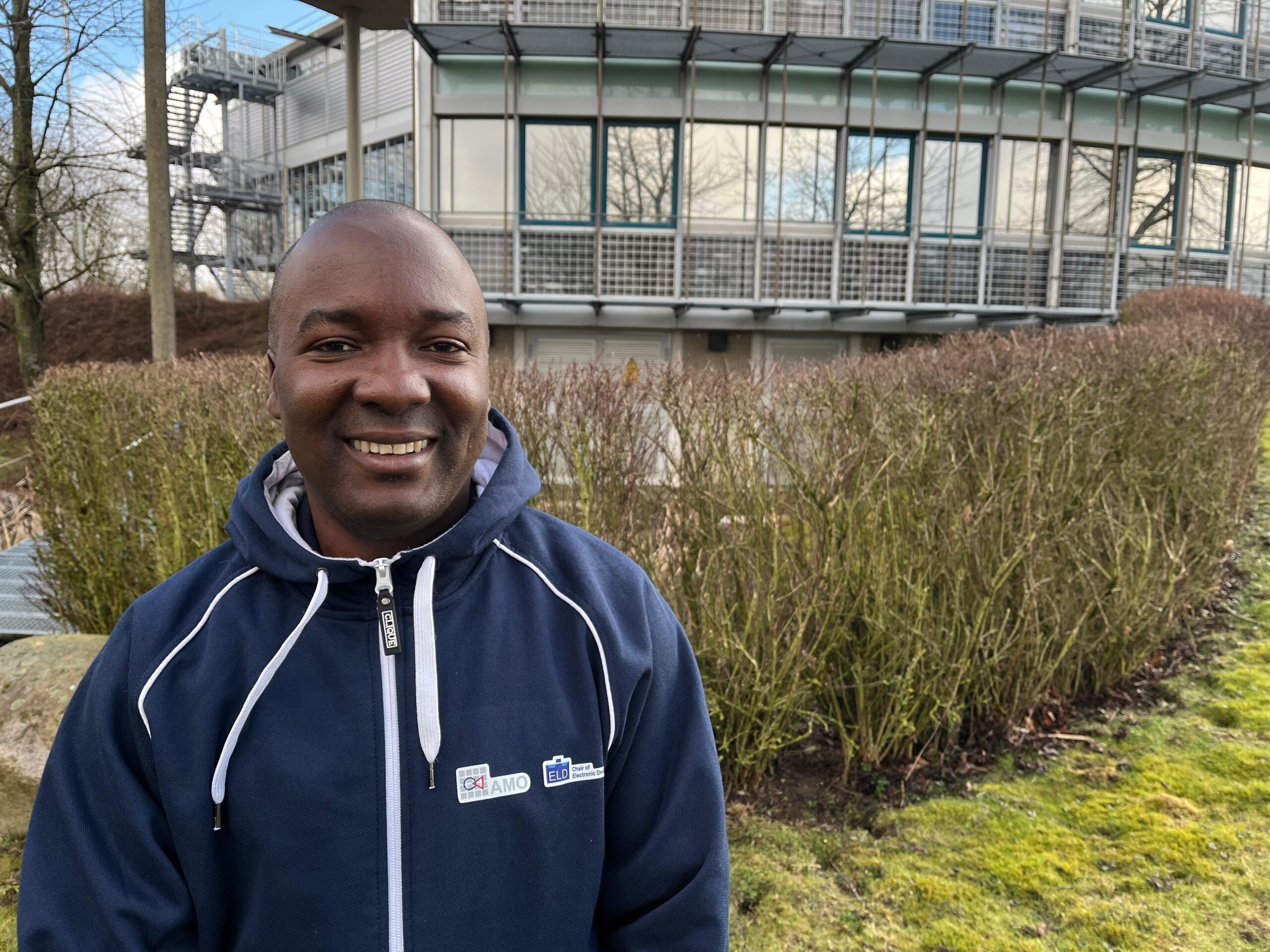
© Judith Peschges
Bayode Adeyanju from Nigeria is developing innovative protective helmets at the Chair of Electronic Devices (ELD) that combine natural and artificial materials.
In February of this year, the scientist arrived at the Chair of Electronic Devices at RWTH Aachen University, having been awarded a scholarship from the German Academic Exchange Service (DAAD). Until May, he will be conducting research under Professor Max Lemme’s supervision, with the objective of developing stable helmets that optimally absorb shocks and offer particularly good protection. For the purposes of his research, Adeyanju is combining artificial Kevlar fibres with natural snail shell nanoparticles. In the context of Nigeria, where snail shells are commonly viewed as a nuisance and a potential environmental concern, their high calcium content renders them of interest for materials research. The scientist crushed both materials and ground them finely. The substance was then combined with epoxy resin, and subsequently filled into a mould, where it underwent a process of hardening. Subsequent tests were then conducted to ascertain the impact resistance, hardness and density of the helmets. The combination of the favourable properties of the two base materials forms the basis for the production of high-performance protective helmets.
In his study, Adeyanju presents the results of his research, which indicates that the combination of natural and artificial materials enables the development of innovative protective materials. At RWTH, the scholarship holder utilises state-of-the-art research facilities and equipment to characterise selected materials. Such studies would not be possible at his home university in Nigeria.
‘Knowledge is power,’ says Adeyanju, adding: ‘RWTH has everything it takes to change the world.’
The first thing he noticed in Aachen was how the streets became quieter in the early evening as people went home, says Bayode Adeyanju. This is very different from his home country of Nigeria, where he is used to having friends and family over. Even though Aachen is quieter in the evenings than Nigeria, Adeyanju felt welcome from the start of his research stay. AMO GmbH, a non-profit research organisation, is also contributing to this by supporting his four-month stay. And after one month at RWTH Aachen, Bayode Adeyanju is sure that he would like to come back and continue his cooperation with the Chair of Electronic Devices (ELD).
‘I have received a great deal of support from my colleagues at the ELD and at AMO, as well as from the students, and I feel very happy here,’ says the scientist.
Adeyanju decided to apply to the DAAD two years ago and was accepted last year. The German Academic Exchange Service is a prominent funding organisation that facilitates international student and academic exchange. Funded by German universities and student bodies, the organisation aims to prepare future specialists and managers to act responsibly and to create lasting connections worldwide. This objective is pursued by fostering professional and cultural networks among scholarship holders. Since its foundation in 1925, the DAAD has sponsored more than 2.9 million young academics in Germany and abroad. It is institutionally supported by the Federal Foreign Office.
With its motto ‘Change by Exchange’, the DAAD emphasises the importance of international understanding and cooperation. Another of the organisation’s central concerns is to support developing countries in establishing efficient universities, thus contributing to social, economic and political development.
Neuromorphic Hardware: Kick-off event in January
The NeuroSys future cluster at RWTH enters its second phase
At the beginning of this year, the Cluster4Future NeuroSys (Neuromorphic Hardware for Autonomous Artificial Intelligence Systems) is entering its second phase.
The Clusters4Future initiative is part of the German government’s High-Tech Strategy 2025 and is funded by the Federal Ministry of Education and Research.
At the kick-off event at the end of January, more than 90 participants discussed their ideas and technologies for the development of neuromorphic hardware in the Super C at RWTH Aachen University.
Neuromorphic systems are modelled on the basic building blocks of the brain, neurons and synapses. Neuromorphic hardware is a resource-saving but powerful basis for energy-intensive artificial intelligence research operations. The aim is to create a technology basis for neuromorphic components and alogrithms, building on the basic research carried out at RWTH Aachen University and the Jülich Research Centre. The coordinator of the future cluster is Professor Max Lemme, Head of the Chair of Electronic Components at RWTH Aachen University.
Learning neuromorphic AI chips could soon enable energy-efficient on-site data processing and thus offer promising prospects for future working methods, smart city concepts and the Internet of Things. Various contributions from autonomous driving to learning systems and personalised medicine will also be delivered.
The second phase of the project is planned for three years and will see RWTH collaborating with a wide range of experts from research and industry.
Further information on the project can be found here
Team AixSense successful in the SensUs competition 2024
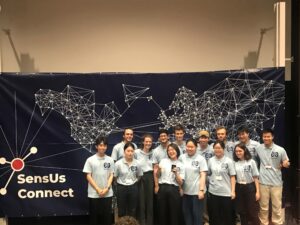
This years AixSense team at the SensUs competition 2024 ©RWTH
The RWTH team impresses with its biosensor for monitoring kidney failure
For the seventh time already, the 15 students of the AixSense team successfully took part in the SensUs competition, organised by Eindhoven University of Technology. This year, 18 teams competed against each other in the international competition with their point-of-care (PoC) biosensor solutions for the real-time detection of creatinine for monitoring acute kidney failure. The AixSense team also included 3 students from the Japanese partner university Tokyo Institute of Technology.
This year, AixSense won three out of five categories with its PoC and also took second place in the technological innovation and technical feasibility categories. Particularly noteworthy is the performance in the area of public relations and scientific communication: the team from Aachen received the Vlog Award for their video diary and AixSense also won the public voting for the Public Inspirations Award.
The Institute for Materials in Electrical Engineering 1 at RWTH Aachen University has been involved in the competition since 2018. Every year, Professor Sven Ingebrandt and Dr. Vivek Pachauri put together a team from various degree programmes. The team is supported by various structures and profile areas at RWTH, such as the Lab center for micro and nanotechnology (ZMNT), which advises the team on technical issues.
The annual competition encourages international and interdisciplinary collaboration in fields such as electrical engineering and micro-nanotechnology, transformative materials, biology, engineering and medical sciences, among others.
Interested parties can apply for the SensUs 2025 competition at pachauri@iwe1.rwth-aachen.de until November 2024.
Max Lemme receives RWTH Fellow award
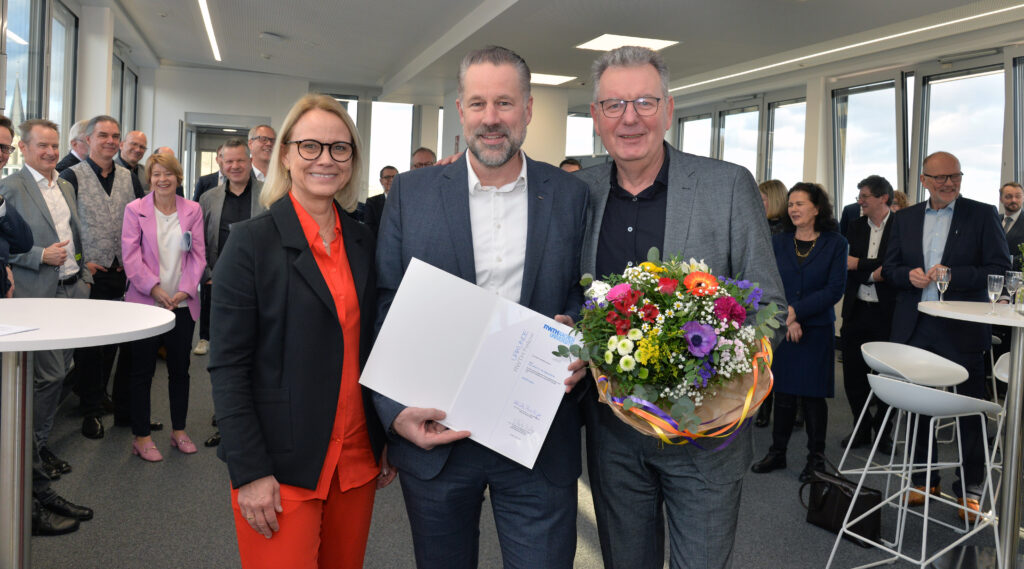
Vice Rector Sabine Brück (left) and Vice Rector Matthias Wessling (right) honour Professor Max Lemme as RWTH Fellow. Photo: Andreas Schmitter
Professor Max Lemme, head of the Department of Electronic Devices, and Professor Harald Müller, head of the Department of Medieval History, are new RWTH Fellows. With this title, the RWTH Aachen University honours professors who have distinguished themselves in research and have rendered outstanding services to the RWTH Aachen University.
Professor Max Lemme is a highly respected expert in the field of devices based on 2D materials and enjoys international recognition. One of his major achievements is a study on a graphene-based field-effect transistor, which has been cited 1353 times to date. He has successfully obtained research funding, including an ERC Starting Grant in 2012 and a Proof of Concept Grant from the European Research Council in 2018. He was also awarded a prestigious Heisenberg Professorship by the German Research Foundation in 2012. Max Lemme was instrumental in the establishment of the NeuroSys Cluster of Excellence and is its spokesperson. He is also an expert reviewer for the European Community and regularly participates in major conferences in the field of semiconductor devices, including IEDM, ESSDERC, DRC and ULIS.
The award he holds was introduced as part of the Excellence Initiative in 2013 and is based on nominations from the Deans of the Faculties.
Click here to go to the website of the Chair of Electronic Components.





